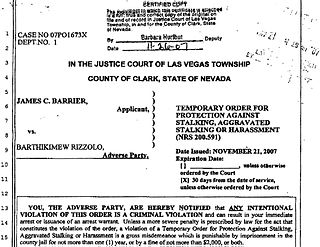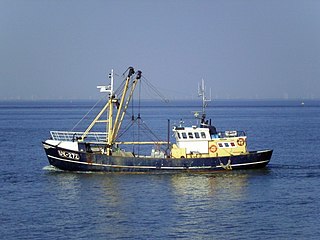
An injunction is a legal and equitable remedy in the form of a special court order that compels a party to do or refrain from specific acts. "When a court employs the extraordinary remedy of injunction, it directs the conduct of a party, and does so with the backing of its full coercive powers." A party that fails to comply with an injunction faces criminal or civil penalties, including possible monetary sanctions and even imprisonment. They can also be charged with contempt of court. Counterinjunctions are injunctions that stop or reverse the enforcement of another injunction.

A restraining order or protective order is an order used by a court to protect a person, business, company, establishment, or entity, and the general public, in a situation involving alleged domestic violence, assault, harassment, stalking, or sexual assault. In the United States, every state has some form of domestic violence restraining order law, and many states also have specific restraining order laws for stalking and sexual assault.

Specific performance is an equitable remedy in the law of contract, whereby a court issues an order requiring a party to perform a specific act, such to complete performance of the contract. It is typically available in the sale of land, but otherwise is not generally available if damages are an appropriate alternative. Specific performance is almost never available for contracts of personal service, although performance may also be ensured through the threat of proceedings for contempt of court.
Breach of the peace, or disturbing the peace, is a legal term used in constitutional law in English-speaking countries, and in a wider public order sense in the several jurisdictions of the United Kingdom. It is a form of disorderly conduct.

R v Secretary of State for Transport was a judicial review case taken against the United Kingdom government by a company of Spanish fishermen who claimed that the United Kingdom had breached European Union law by requiring ships to have a majority of British owners if they were to be registered in the UK. The case produced a number of significant judgments on British constitutional law, and was the first time that courts held that they had power to restrain the application of an Act of Parliament pending trial and ultimately to disapply that Act when it was found to be contrary to EU law.
A legal remedy, also judicial relief or a judicial remedy, is the means with which a court of law, usually in the exercise of civil law jurisdiction, enforces a right, imposes a penalty, or makes another court order to impose its will.
Equitable remedies are judicial remedies developed by courts of equity from about the time of Henry VIII to provide more flexible responses to changing social conditions than was possible in precedent-based common law.

Kiryat Netafim is an Israeli settlement in the northern West Bank. Located about 30 km east of Tel Aviv, it is organised as a community settlement and falls under the jurisdiction of Shomron Regional Council. In 2017 it had a population of 929.
Asset freezing is a legal process which prevents a defendant whether innocent or guilty to an action from dissipating their assets from beyond the jurisdiction of a court so as to frustrate a potential judgment. It is widely recognised in other common law jurisdictions and such orders can be made to have world-wide effect. It is variously construed as part of a court's inherent jurisdiction to restrain breaches of its process.
An interlocutory injunction is a court order to compel or prevent a party from doing certain acts pending the final determination of the case. It is an order made at an interim stage during the trial, and is usually issued to maintain the status quo until judgment can be made.
The term interim order refers to an order issued by a court during the pendency of the litigation. It is generally issued by the Court to ensure Status quo. The rationale for such orders to be issued by the Courts is best explained by the Latin legal maxim "Actus curiae neminem gravabit" which, translated to (English,) stands for "an act of the court shall prejudice no one". Therefore, to ensure that none of the interests of the parties to the litigation are harmed, the court may issue an interim order.

Prince Albert v Strange was a court decision made by the High Court of Chancery in 1849, and began the development of confidence law in England. The court awarded Prince Albert an injunction, restraining Strange from publishing a catalogue describing Prince Albert’s etchings. Lord Cottenham LC noted that "this case by no means depends solely upon the question of property, for a breach of trust, confidence, or contract, would [sic] of itself entitle the plaintiff to an injunction".

The Protection from Harassment Act 1997 is an Act of the Parliament of the United Kingdom. On introducing the Bill's second reading in the House of Lords the then Lord Chancellor, Lord Mackay of Clashfern said "The aim of this Bill is to protect the victims of harassment. It will protect all such victims whatever the source of the harassment—so-called stalking behaviour, racial harassment, or anti-social behaviour by neighbours." Home Office guidance on the Act says "The legislation was always intended to tackle stalking, but the offences were drafted to tackle any form of persistent conduct which causes another person alarm or distress."

Cream Holdings Ltd v Banerjee [2004] UKHL 44 was a 2004 decision by the House of Lords on the impact of the Human Rights Act 1998 on freedom of expression. The Act, particularly Section 12, cautioned the courts to only grant remedies that would restrict publication before trial where it is "likely" that the trial will establish that the publication would not be allowed. Banerjee, an accountant with Cream Holdings, obtained documents which she claimed contained evidence of illegal and unsound practices on Cream's part and gave them to the Liverpool Daily Post & Echo, who ran a series of articles on 13 and 14 June 2002 asserting that a director of Cream had been bribing a local council official in Liverpool. Cream applied for an emergency injunction on 18 June in the High Court of Justice, where Lloyd J decided on 5 July that Cream had shown "a real prospect of success" at trial, granting the injunction. This judgment was confirmed by the Court of Appeal on 13 February 2003.

Greene v Associated Newspapers Ltd [2004] EWCA Civ 1462 is a case of the Court of Appeal of England and Wales that governs the use of injunctions against publication in alleged defamation cases. Greene, a businesswoman, sought an injunction against Associated Newspapers Ltd to prevent them publishing alleged links with Peter Foster; while they claimed to have emails showing links, she asserted that they were false. The test at the time for a preliminary injunction in defamation cases was Bonnard v Perryman, where it was established that the applicant has to show "a real prospect of success" at trial. The Human Rights Act 1998 established that judges should consider whether applicants are "more likely than not" to succeed at trial, a test applied to confidentiality cases in Cream Holdings Ltd v Banerjee and the Liverpool Post and Echo Ltd. Greene claimed that the Cream test should be applied rather than the Bonnard test.

CTB v News Group Newspapers is an English legal case between Manchester United player Ryan Giggs, given the pseudonym CTB, and defendants News Group Newspapers Limited and model Imogen Thomas.
In English tort law, a super-injunction is a type of injunction that prevents publication of information that is in issue and also prevents the reporting of the fact that the injunction exists at all. The term was coined by a Guardian journalist covering the Trafigura controversy. Due to their very nature media organisations are not able to report who has obtained a superinjunction without being in contempt of court. The term super-injunction has sometimes been used imprecisely in the media to refer to any anonymised privacy injunction preventing publication of private information. Critics of super-injunctions have argued that they stifle free speech, that they are ineffective as they can be breached using the Internet and social media and that the taking out of an injunction can have the unintended consequence of publicising the information more widely, a phenomenon known as the Streisand effect.
Injunctions in English law are a legal remedy of three types. Prohibitory injunctions prevent an individual or group from beginning or continuing an action which threatens or breaches the legal rights of another. Mandatory injunctions are rarer and compel a person to carry out a certain act such as make restitution to an injured party. Freezing injunctions relate to funds such as bank accounts and are commonly Mareva Injunctions which are sought mainly in fraud, breach of trust and confiscatory proceedings. Injunctions are most common in cases involving significant matters of nuisance, privacy and libel ; they are relatively common remedies in major employment/agency/distribution, trust and property disputes, especially interim, interlocutory injunctions pending settlement or final hearing, whichever is the earlier where there is a clear and present danger that the matter in dispute between the parties will be wholly frustrated if the injunction is not imposed. A final hearing only may impose a final injunction which may be equivalent to undertakings given in a legally binding settlement document.

The Anti-Social Behaviour, Crime and Policing Act 2014 is an Act of the Parliament of the United Kingdom that consolidated and expanded law enforcement powers in addressing anti-social behaviour. One significant aspect of The Act is that it replaced anti-social behaviour orders, the primary civil order in the United Kingdom since 1998, with criminal behaviour orders. Home Secretary Theresa May and John Taylor, Baron Taylor of Holbeach introduced the legislation.

PJS v News Group Newspapers is an English legal case in which an anonymised privacy injunction was obtained by a claimant, identified in court documents as "PJS", in order to prohibit publication of the details of a sexual encounter between him and two other people. Media outside England and Wales identified PJS as David Furnish.









